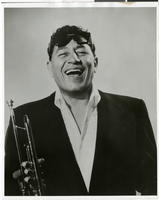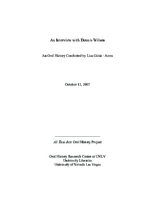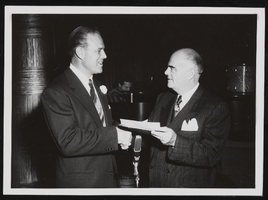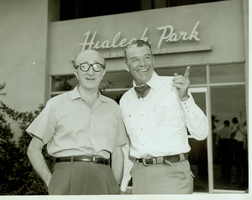Search the Special Collections and Archives Portal
Search Results

Transcript of interview with Ronald Simone by Claytee White, May 5, 2009
Date
Archival Collection
Description
Musician Ronald Simone of Las Vegas credits his father’s guidance and his upbringing in New Haven, Connecticut, for shaping his musical and educational aspirations. Due to its proximity to New York City and the influence of Yale University, New Haven offered its residents the finest in musical entertainment; as a result, many musical greats were from or had lived in New Haven and most Broadway shows opened at New Haven’s Shubert Theater. Born in 1935 with the gift of perfect pitch, Simone began to play the piano at a young age and could play most pieces by ear. He began playing professionally at age eight in 1943 with a weekly stint on a radio show, Kitty's Revue. Still in grade school during World War II he began touring locally with an amateur producer, who formed a show that played military bases and hospitals around Connecticut and into New York and Massachusetts. In high school Simone formed his own trio and a quartet and played piano in gin mills, illegal card rooms, and resorts in upstate New York while playing trumpet in the high school band. He joined the Musicians Union at 18 and continued to play in New York and Connecticut clubs and theaters throughout his five years at Yale. During his second year at Yale the School of Music became a graduate school, from which Ron graduated in 1958. Ron’s sister Louise married one of his Yale classmates, a drummer, and the couple moved to Las Vegas. Ron visited his sister in 1959, loved the musical opportunities he saw, transferred his Musicians Union membership, and moved to Las Vegas with his friend, violinist Joe Mack, in September 1960. After sub work and playing a lounge show at the Riviera, he spent five and a half years in the Riviera showroom, moving in 1966 to the Desert Inn, where he played piano in the exclusive Monte Carlo Room for five years for the likes of Dean Martin, Sandy Koufax, Sammy Davis Jr., and Kirk Kerkorian. From there Simone went to the Dunes, where he remained for the next nineteen years working with choreographer Ronnie Lewis and rehearsing and playing all the Casino de Paris shows, line numbers, and production numbers. In July 1989, Musicians Local 369 went on strike. Because Simone was playing the Follies Bergere at the Tropicana—the first house band to strike—he was among the first musicians to walk out. Musicians at all but three Strip hotels (Circus Circus, Riviera, and the Stardust) followed. While the musicians strike lasted nearly eight months, Simone was recruited for sanctioned sub work for the duration at the Lido de Paris show at the Stardust. After the strike ended he worked with Johnny Haig's relief band playing six nights a week at various hotels.
Text

Carmon Meswarb interview, April 15, 1976: transcript
Date
Archival Collection
Description
On April 15, 1976, Judy Hammer interviewed Carmon Meswarb (b. February 9, 1932 in Cedar Falls, Iowa) about his life as a musician in Las Vegas, Nevada. Meswarb discusses how he ended up in Las Vegas, the musicians union and his time playing in a relief band. Meswarb also delves into the different entertainment acts of the 1950s and 1960s, the big-name performers, the city’s showgirls and racial segregation in entertainment. Moreover, Matson talks about the changing landscape of the city, residential areas and the changed attitude of the Strip. The interview ends with Meswarb discussing the short stint of Broadway shows on the Las Vegas Strip.
Text

Transcript of interview with Ernie Hensley by Lisa Gioia-Acres, Janurary 25, 2008
Date
Archival Collection
Description
Ernie Hensley, an accomplished African American musician, was born in Washington D.C. on March 14 1940, the son of Ernest W. Hensley Jr. and Gladys Barbara Hensley. Both of his parents worked for the federal government in the nation's capital. Ernest W. Hensley Jr., was an employee at the Department of Defense and Gladys Barbara Hensley mother, who was an excellent pianist and drum major, ultimately set her musical career aside to provide for her family and worked for the National Labor Relations board. At the age of seven, after finding a saxophone in his grandmother's attic, Ernie embarked on his musical journey. He took lessons at the Modem School of Music in Washington D.C. Eventually acquired proficiency with the clarinet and the flute through long hours of practice. Ernie attended a historically black school, Armstrong High School in D.C., until he was transferred to integrated McKinley High School in 1954 following the Brown v. Board of Education ruling. Ernie recalls his experience in a new desegregated environment. After High School in 1957, Ernie joined the Air Force as a member of the 511th Air Force Band. In 1959 he resettled in France to play saxophone for the Air Force Band. Emie ultimately made a career in the Air Force. He had countless experiences of performing around Europe and in Washington D.C. at places like Constitution Hall. A dream came true when Emie was honored to become a member of the "Airmen of Note," the premier jazz ensemble for the United States Air Force. He retired from the Air Force in 1979. Because of his distinguished career in the United States Air Force, Emie had a number of opportunities once he retired from the military. He moved to Las Vegas in 1979 at age 39 and after living in area for just a few weeks, Emie started working with Johnny Haig 3 nights a week. Shortly thereafter, Emie found a long-term home working with Jimmy Mulidore's group at the Hilton for nearly a decade until 1995. Throughout Ernie's lifetime he has been fortunate to work with notable musicians such as Andy Williams, Sammy Davis Jr., Somers, Juliet Prowse, Steve an Eydie and his good friend Sarah Vaughn. Emie, along with his wife Carolyn, a retired UNLV faculty member, still resides in Las Vegas.
Text

Transcript of interview with Adelaide Robbins by Lisa Gioia-Acres, April 18, 2008
Date
Archival Collection
Description
Adelaide was born in Manhattan, New York to a father who was a pianist and arranger and a mother who was a dancer on Broadway. She grew up as an only child in the theater district where she was exposed to the arts from a young age. Her parents insisted she be well rounded. To that end, she began piano lessons at age six and was frequently taken to museums. Adelaide was always drawn to music and began working professionally by the age of 12. She attended the High School of Music and Art for four years along with others who went on to great fame. While in high school, she earned awards for composition. Her knowledge and abilities of the bass earned her a full scholarship to the Eastman School of Music. All of the jobs she had during high school and college were music related; playing gigs or teaching. While working towards a triple major at Eastman, she felt over-extended and eventually transferred to the Manhattan School of Music who was honored to have a transfer from Eastman. Also because of the extra credits from Eastman, she was able to obtain a master’s degree inside of a year. Adelaide went on the road with Buddy Rich’s band where they played in Chicago and Los Angeles before finding their way to Las Vegas. Adelaide was always the only woman in the band, and there were difficulties of being a woman in the field of mostly male musicians. The band found their way to Las Vegas in 1967. She never realized how well known she was until she arrived in Las Vegas. Adelaide came to Las Vegas on a trial run and ended up staying. The first job she had in Las Vegas was playing solo piano at Guys and Dolls before moving on to playing as a rehearsal pianist for a Broadway show. Over the years, Adelaide played many venues with many famous musicians. She is not hopeful for the future of musicians in Las Vegas, feeling the casino owners would rather replace live musicians with canned music. However, Adelaide’s career is not over as she is still performing for a variety of events. With her two degrees from very prominent music schools, Adelaide feels she may have gone further in career if she had stayed in New York, but she has no regrets about coming to Las Vegas.
Text

Photograph of Louis Prima, Las Vegas, 1966
Date
Archival Collection
Description
Image

Transcript of interview with Dennis Wilson by Lisa Gioia-Acres, October 12, 2010
Date
Description
Dennis Wilson an experienced musician was born in Arabi, Louisiana in 1951. His parents both served in the Marine Corps. Dennis started playing the clarinet in the 4th grade but he did not stop there by the time he was in college he could play the alto saxophone, flute, and clarinet. He received a scholarship to Loyola University in New Orleans. The first introduction to Las Vegas was in 1971. At this time Dennis played for Wayne Cochran and the C.C. Riders traveling all around the United States with the band. In 1979 Dennis moved back to Las Vegas after a short stay in New Orleans. On his return to Las Vegas Dennis recalls his experiences playing with relief bands and performing weekly at Stardust, Dunes, Flamingo, Tropicana, Sands and Caesars. Dennis recalls what it was like working in Las Vegas and the rigorous schedule of a musician. Dennis has had a successful carrier as a musician he went on to play for Burt Bacharach and Dionne Warwick traveling the world. He then settled back in Vegas working on prominent shows such as Avenue Q, Spamalot, and Phantom of the Opera. Dennis still resides in Las Vegas and is now a paraprofessional at Johnson Junior High.
Text
Ronald Simone oral history interview
Identifier
Abstract
Oral history interview with Ronald Simone conducted by Claytee D. White on May 05, 2009 for the All That Jazz Oral History Project. In this interview Ronald Simone discusses his upbringing in Connecticut, moving to Las Vegas, Nevada in September 1960 with his friend Joe Mack, and his career as a jazz musician working at various lounges and showrooms throughout Las Vegas. He also discusses the various famous people he performed for and the July 1989 musicians strike.
Archival Collection
Valerie Johnson oral history interview
Identifier
Abstract
Oral history interview with Valerie Johnson conducted by an unknown collector on an unknown date in the 1970s for the Ralph Roske Oral History Project on Early Las Vegas. In this interview Valerie Johnson discusses her career as a trumpet player in the United States Air Force Women's band. Johnson talks about her experiences as a musician, her travels in the military, and the discrimination she and her fellow musicians faced from male military musicians.
Archival Collection

C. Normal Cornwall and Horace Heidt: photographic print
Date
Archival Collection
Description
Image

Rex Bell and Herman D. Kenin in front of building: photographic print
Date
Archival Collection
Description
Dorothy Bell Scans UNLV-Public Lands Institute. Rex Bell (George Francis Beldam) (left) with man at unknown location. Handwritten on back: "Herman D. Kenin, President AF of Musicians. June, 1960."
Image
